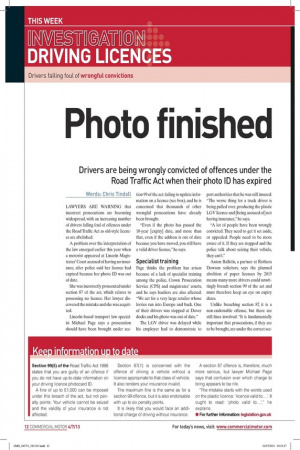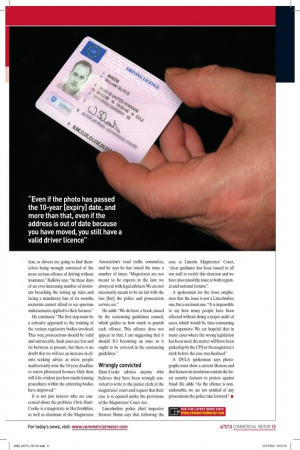Section 99(5) of the Road Traffic Act 1988 states that
Page 9

Page 10

If you've noticed an error in this article please click here to report it so we can fix it.
you are guilty of an offence if you do not have up-to-date information on your driving licence photocard ID.
A fine of up to £1,000 can be imposed under this breach of the act, but not penalty points. Your vehicle cannot be seized and the validity of your insurance is not affected. Section 87(1) is concerned with the offence of driving a vehicle without a licence appropriate to that class of vehicle. It also renders your insurance invalid.
The maximum fine is the same as for a section 99 offence, but it is also endorsable with up to six penalty points.
It is likely that you would face an additional charge of driving without insurance. A section 87 offence is, therefore, much more serious, but lawyer Michael Page says that confusion over which charge to bring appears to be rife.
"The mistake starts with the words used on the plastic licence: 'licence valid to...'. It ought to read: 'photo valid to...'," he explains.
• For further information: legislation.gov.uk tion, or drivers are going to find themselves being wrongly convicted of the more serious offence of driving without insurance," Balkitis says. "In these days of an ever-increasing number of motorists breaching the totting up rules and facing a mandatory ban of six months, motorists cannot afford to see spurious endorsements applied to their licences."
He continues: "The first step must be a cohesive approach to the training of the various regulatory bodies involved. That way, prosecutions should be valid and enforceable. Such cases are few and far between at present, but there is no doubt that we will see an increase in clients seeking advice as more people inadvertently miss the 10-year deadline to renew photocard licences. Only then will it be evident just how much training procedures within the enforcing bodies have improved."
It is not just lawyers who are concerned about the problem. Chris HuntCooke is a magistrate in Hertfordshire, as well as chairman of the Magistrates Association's road traffic committee, and he says he has raised the issue a number of times. "Magistrates are not meant to be experts in the law; we always sit with legal advisers. We are not necessarily meant to be au fait with the law, [but] the police and prosecution service are."
He adds: "We do have a book, issued by the sentencing guidelines council, which guides us how much to punish each offence. This offence does not appear in that; I am suggesting that it should. It's becoming an issue so it ought to be covered in the sentencing guidelines."
Wrongly convicted Hunt-Cooke advises anyone who believes they have been wrongly convicted to write to the justice clerk at the magistrates' court and request that their case is re-opened under the provisions of the Magistrates' Court Act.
Lincolnshire police chief inspector Stewart Brinn says that following the case at Lincoln Magistrates' Court, "clear guidance has been issued to all our staff to rectify this situation and we have also raised the issue at both regional and national forums".
A spokesman for the force emphasises that the issue is not a Lincolnshire one, but a national one. "It is impossible to say how many people have been affected without doing a major audit of cases, which would be time-consuming and expensive. We are hopeful that in many cases where the wrong legislation has been used, the matter will have been picked up by the CPS or the magistrate's clerk before the case was finalised A DVLA spokesman says photographs must show a current likeness and that licences in circulation contain the latest security features to protect against fraud. He adds: "As the offence is nonendorsable, we are not notified of any prosecutions the police take forward." •









































